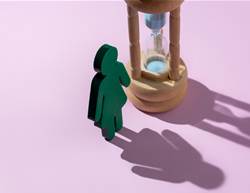“Across a woman's health journey, too often we don't feel heard, we don't feel listened to, and because of that, we don't feel like we get the care we need,” says senator Marielle Smith.
This affects us on a range of health problems, from periods and endometriosis through to chronic pain and even heart disease. Too often women’s pain or experiences are dismissed, misdiagnosed, not talked about or poorly understood.
It needs to change, and the South Australian senator is starting with menopause, co-sponsoring and acting as the deputy chair of the Senate Community Affairs committee's inquiry into menopause.
During the nine-month inquiry, the committee heard from 300 women who were keen to share their experiences of perimenopause and menopause. The recommendations from the report, which need to be approved by the government, have the potential to change the experience of menopause for all Australian women.
Why is the inquiry needed?
“We wanted to use the spotlight we have in the Senate to shine a light on issues surrounding perimenopause and menopause, because we were hearing too often for women that when it came to their health care and when it came to work, they just weren't getting the support that they needed,” says Smith.
First, women can often feel hesitant about talking about their health problems. Then, sadly, when they do go to a medical practitioner about them, “often those conversations don’t go very well”, says Smith.
The committee heard evidence of “misdiagnosis, family breakdowns and divorce, crippling mental health issues, and suicidal thoughts among women as a result of stigma and insufficient support related to menopause,” reports The Australian Financial Review.
“They felt like when they shared their experiences of pain, that was dismissed. Often their symptoms were talked about as being just part of midlife and the stressful time that all women go through. And they also said that when they asked their doctors for help, often they felt like they didn't have up to date information on treatments like HRT [also known as menopausal hormone therapy or MHT], or that they just weren't really ready or willing to engage in a conversation about perimenopause in particular,” says Smith.
Smith said one of the biggest issues around menopause in Australia currently is that women don’t have access to quality support, advice and treatment.
“I think the biggest issue is this concern around women not feeling heard and like they can have a conversation and get good quality advice and information, and that was shared with us by GPs too. GPs told us that they felt underprepared after university to treat their patients with symptoms of menopause, and that they wanted more information, they wanted more professional development to be able to support women at this point of their lives, but just weren't able to get it.
“Every single woman who reaches midlife will experience menopause, and while she may not experience it in the same way as her mother or her sister or her friend, it's very likely that she will need some kind of support, some kind of conversation, or at least good quality information to help guide her through this part of life.
“Women deserve to be heard, and we need to raise our voices together and demand a better quality of care.”
What recommendations did the Senate inquiry make?
The Senate inquiry made 25 recommendations, which can be broken down into three key areas. senator Smith sums them up.
Educating medical professionals
The first key area was healthcare, to ensure that women had access to quality information and treatment, and that perimenopause was being researched appropriately.
“Menopause isn't an optional part of ageing. Good quality primary healthcare should not be optional either. So, we made a number of recommendations, which went to lifting the standards of education, of training medical students… to make sure they're better equipped as soon as they enter the workforce,” she says.
“We need to be clear. You know, this is not something which might happen to one of your patients. This will happen to every woman in your [care] so you better be prepared to help her and to be able to support her if she needs you to.”
Perimenopause and the workplace
“We've also made recommendations which go to a woman's experience in the workplace. We know for some women who have really troubling symptoms, it can affect their ability to go for that next promotion or to stay at work.
“They might want to take time off to manage their symptoms. They may feel like stepping up for that next opportunity is just a bit hard whilst they're… working out how to manage those symptoms, and we absolutely don't want to see this happen. You know, we're talking about women at the absolute prime of their lives and in the peak of their careers. These are the women we should be most concerned with keeping in the workforce, keeping connected, making sure they continue to thrive.
“Women told us, overwhelmingly, it was little things which could make a big difference. So small changes at work, like a desk fan at your desk, or perhaps a slightly later start date… or the ability to work from home. If you've had a really rubbish night’s sleep, it might be the ability to travel to work outside of peak hour so you're not on a stuffy, overcrowded train … For an employee with troubling symptoms that could be the difference between her staying at work and not.
“It's a different challenge, though, for women in environments like the factory floor or women who work on a checkout or in a childcare centre, because those sorts of adjustments aren't going to be possible for them, and that's why we've asked workplaces to sit down with their employees and have a conversation about what flexibility might mean in your workplace.
“Ideally all these conversations would happen at a workplace level. But having that support from the federal government and in those frameworks, I think, could be really powerful and important,” says Smith.
Education and conversations
“Finally, we made recommendations which look at the stigma which surrounds these issues, because we know that the stigma around perimenopause and menopause is stopping good conversations happening in workplaces about what needs to change. It's stopping women getting good quality advice and help, and we just can't let that keep happening. We need to be talking about women's health issues. There's no shame in something which will affect every single woman at the peak and prime of her life.”
How can we change the conversation around menopause?
The inquiry includes recommendation that the government launch a national perimenopause awareness campaign and make it part of the school curriculum to both better educate the population and help to normalise this experience.
“I'd like to see that national conversation backed up with really good quality information resources and public communications. And that's not just about women. It's also about their partners. It's about their doctors, and it's about their workplaces. We had husbands come and present to us as the committee to tell us that they could see their wife was struggling, but they just didn't know what was going on. They did not know how to support her, and they just wanted some more information so that they could be a good partner and a good supporter.
“We had women tell us that it took just ages for them to work out it was menopause that was causing their symptoms. It was only after a conversation with a few friends that someone pointed them to a checklist, [that they] went, ‘Oh, okay, I get it. It clicks. Now this is what's going on in my life.’
“We also heard from employers who said, ‘I want to be a good employer. I don't want to lose these amazing women from my workplace, but what do I do? Tell me what I need to understand.’
“So having good public information out there, I think can be empowering for all of us, and I also think it will make a difference. We want women to get good information, to have that easily accessible, and we need this stigma just stripped away, because you don't change things if they're kept in the dark.
“But if we talk about them, if we know what's happening, what's coming, and we also help tackle that stigma really, really early, I think that's going to be very powerful.”
What’s next?
Now that the recommendations have been made, what's next? Will we see significant change in the way menopause is talked about and treated in Australia?
“I'm both hopeful and prepared to fight for it," says Smith. "I think we deliberately made recommendations to a broader group than government. Some of this will require government action, but a lot of it needs to change at a community level. We need to change this in workplaces. We need to change this in the medical profession. We need to change it in schools, and that requires collective action from all of us, because there's not one simple thing the government can do to fix some of the problems we're seeing here, but I do think the government can take a leadership role. So I'll be using my sharpest elbows amongst my colleagues to try and get some change here, but also continuing to have this national conversation.”
“As women, we need to keep raising our voices, keep the pressure on. Reach out to your [local] MP and tell them you want to see change here. Have that conversation in your workplace. Talk about your symptoms and your experiences, with your friends, with your partner. You know, let's break down this stigma together. Keep this pressure high, because that's the way we'll see change.”
To hear more from Senator Marielle Smith on the Senate inquiry into menopause, listen to the Thriving in Menopause podcast episode below.













